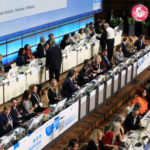The 2023 European Lung Cancer Congress (ELCC) was held from March 29th to April 1st, in a combined online and offline format in Copenhagen, Denmark. Professor Nicolas Girard from the Curie Institute in Paris, France, presented the 3-year data update (Abstract 84O) of the CheckMate 816 study on neoadjuvant immune combined with chemotherapy in the Proffered Paper 2 session. In an interview with Oncology Frontier he further discussed the significant research data released at ELCC 2023, the status of dual immune checkpoint inhibitor regimens in the treatment of driver gene-negative non-small cell lung cancer (NSCLC), and the treatment of EGFR exon 20 insertion mutations (ex20ins) subtype.
Oncology Frontier:Please provide your comments on the 2023 ELCC reports of the EMPOWER-Lung 3, CONTACT-01, and CheckMate 816 studies.
ELCC 2023 presented several new research data, including the data from the EMPOWER-Lung 3 study on the treatment of metastatic lung cancer with immunotherapy combined with chemotherapy (Abstract 5O). The CONTACT-01 study, comparing atezolizumab + cabozantinib with docetaxel in previously treated immunotherapy and chemotherapy progressed metastatic NSCLC patients, yielded negative results (Abstract 6O). These new data help us contemplate the treatment strategies currently under development, the development of new treatment regimens, and how to provide the best individualized immunotherapy for patients.
The combination of nivolumab and platinum-based doublet chemotherapy as neoadjuvant therapy for resectable (tumor ≥ 4cm or lymph node-positive) NSCLC has received approval in several countries. After the primary analysis results of event-free survival (EFS) and pathological complete response (pCR) from the CheckMate 816 study were published, this regimen has become the standard of care in many regions. ELCC 2023 released the 3-year data update for CheckMate 816, which clearly demonstrates continued EFS benefit for resectable NSCLC patients receiving neoadjuvant nivolumab combined with chemotherapy. The results show that, with a reduction in the risk of disease progression after neoadjuvant immunotherapy and surgery by approximately 40%, the hazard ratio (HR) remains similar to previous data. ELCC 2023 also updated overall survival data, reinforcing the value of the neoadjuvant nivolumab combined with chemotherapy regimen, although the data for this combination is not yet statistically significant. The recurrence pattern analysis data presented by CheckMate 816 also allows us to better understand the differences in recurrence patterns between the two groups of patients. Interestingly, the CheckMate 816 study suggests that adding nivolumab for three cycles on top of chemotherapy effectively prevents patients from developing central nervous system diseases.
Oncology Frontier:With an increasing number of immunotherapy options for driver gene-negative advanced NSCLC, please discuss the status of dual immune checkpoint inhibitor regimens combined with chemotherapy.
For the treatment of driver gene-negative NSCLC patients, we need to stratify patients, with one straightforward method being to observe PD-L1 status. It is becoming increasingly clear that for tumors that are PD-L1 negative, chemotherapy combined with anti-PD-1 drugs can be used. However, this may not be sufficient to provide clinically meaningful long-term survival for patients.
Regarding dual immune therapy (with or without chemotherapy), I must say that long-term progression-free survival (PFS) and overall survival (OS) may be higher, especially in PD-L1 negative tumor patients. In the case of dual immune checkpoint inhibitor therapy, the predictive value of PD-L1 expression for long-term survival or its correlation with long-term survival is lower.
Ultimately, compared to patients currently receiving chemotherapy plus single-agent immunotherapy, dual immune therapy may achieve a better long-term prognosis.
Oncology Frontier:What challenges and unmet needs are faced in the treatment of EGFR exon 20 insertion mutation NSCLC?
EGFR mutation-positive patients are an important part of the lung cancer population. Within this EGFR mutation subgroup, there are patients with common mutations, but there are also patients with uncommon EGFR mutations, including EGFR exon 20 insertion mutations. For EGFR ex20ins patients, there are currently targeted drugs available for third-line treatment, including the dual-specificity antibody amivantamab and the TKI drug mobocertinib. Currently, targeted therapy is being evaluated for first-line treatment in EGFR ex20ins mutation NSCLC, among patients who have failed chemotherapy. Therefore, it is crucial, as a first step for all newly diagnosed metastatic lung cancer patients, to identify patients with EGFR exon 20 insertion mutations through second-generation sequencing, as recommended by the ESMO practice guidelines.
Another challenge faced by EGFR exon 20 insertion mutation patients is establishing the optimal treatment sequence based on the resistance mechanisms to various drugs. There are many new drugs under evaluation, making this a very intriguing research area. EGFR exon 20 insertion mutation NSCLC patients may be smokers or non-smokers, but ultimately, we cannot miss the opportunity to develop truly effective strategies for these patients.
ELCC 2023 presented some promising data, including the latest results from the CHRYSALIS trial evaluating amivantamab for platinum-refractory EGFR ex20ins advanced NSCLC patients (Abstract 3O). Interestingly, in this study, a significant proportion of patients had been on amivantamab for over two years, and approximately one-third of surviving patients still had no disease progression after two years. We hope to see this kind of efficacy in clinical treatment and in the majority of patients.


